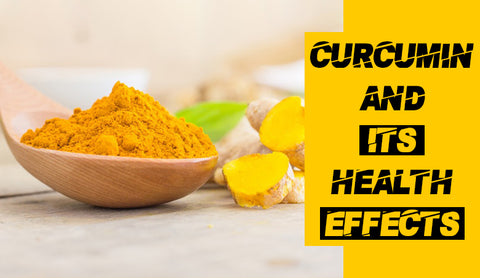Curcumin is a compound present in turmeric. It is derived from the plant Curcuma longa. Turmeric has been in used since ancient times because of its strong medicinal properties.
Turmeric contains several bioactive compounds called curcuminoids. Curcumin is one such active ingredient in turmeric known for its yellow colour, powerful antioxidant and anti-inflammatory properties.
Inflammation is a process that occurs naturally in our body. Short term inflammation does not cause any harm but long term or chronic inflammation is associated with an increased risk of several diseases like heart disease, cancer and several age-related neurological disorders. Several studies have proved that curcumin is highly effective in reducing inflammation.
Without causing any side effects, curcumin exerts its anti-inflammatory action, similar to certain strong anti-inflammatory drugs. Hence, inflammation which is the root cause of certain diseases can easily be curbed by making curcumin a part of our diet.
Due to its ability to reduce inflammation, curcumin is a boon for people suffering from osteoarthritis and arthritis. It eases joint pain, stiffness, and reduces muscle soreness by diminishing the levels of inflammatory markers called cytokines. In addition, researchers have found that curcumin also reduces inflammation by blocking the activation of necrosis factor beta, an inflammatory marker in our body.
Inflammation in our body is also connected with certain metabolic disorders like insulin resistance, hyperglycaemia, hypertension, elevated triglyceride levels and visceral obesity. Hence, regular intake of curcumin means lesser risk of chronic metabolism disorders.
Curcumin is also best known for its antioxidant properties. It neutralises free radicals and prevents them from damaging our healthy cells. Free radicals in our body are linked with affecting the brain. They may cause early ageing, reduce cognitive functioning and damage cardiac cells. Curcumin not only destroys these radicals but also boost the functioning of our body’s own antioxidant enzymes. Our brain consists of a hormone called brain-derived neurotrophic factor (BDNF). Low levels of this growth hormone may cause malfunctioning of brain neurons, which may give rise to certain brain disorders. Curcumin supports our brain by elevating the levels of BDNF. High levels of BDNF improves our memory and delays or prevents the onset of age-related brain diseases like Alzheimer.
Being packed with antioxidants, curcumin intake can also give us healthy skin. It acts as a detoxifier, purifies blood and remove all toxins from the body. Include turmeric or curcumin extract in your diet to get a blemish-free, bright and shiny skin.
Another incentive of consuming curcumin is its anti-cancer properties. Cancer leaves a very bad effect on our body. The medications and treatment therapy might reduce the functioning of other organs and effect our immune system. Recovering from cancer treatment requires lot of extra care. Our diet and lifestyle plays a very important role in reducing the risk of cancer. Turmeric holds a very important place when it comes to a list of anti-cancer foods. Presence of curcumin imparts turmeric, its anti-cancer effect by averting and reducing the growth of cancerous cells in the body, preventing it from spreading.
As per the Joint United Nations and World Health Organization, curcumin intake of 0-3 mg per kg body weight is safe. When consumed in higher dosages about 1200 mg, subjects have often complained of a headache, diarrhoea, nausea and rashes under some studies.
To conclude, health benefits of curcumin are scientifically proven. Its wide range of health benefits makes curcumin safe and favourable for all. Curcumin is a fat soluble compound, therefore, preferably it should be taken with fat containing meals. Also, if you are opting for a curcumin extract supplement, then choose a supplement that contains bio-piperine as well. This is because piperine has been shown to increase the absorption and bioavailability of curcumin by 2000%.


